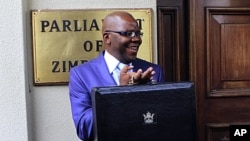Zimbabwe's finance minister has told parliament the economy will grow by more than nine percent next year, fueled by continued recovery and increased mining activity. Tendai Biti said he pushed the budget to $4 billion for 2012, anticipating dramatically increased revenue from Zimbabwe’s alluvial diamond mines in which the government has a half share.
Tendai Biti said Thursday he has created a “pro-poor” budget for 2012, and has set aside additional revenue for recovery of the agricultural sector. The sector collapsed in the years after 2000, when President Robert Mugabe and his supporters seized some 90 percent of Zimbabwe's white-owned commercial farms.
Biti said he has allocated enough money for a census next year, as well as a referendum for a new constitution which is still being drafted.
People on the street gathered around televisions and radios to hear Biti’s speech Thursday. Many say that the three-year-old inclusive government has not yet begun to help them recover from Mr. Mugabe’s catastrophic last decade in power.
Ahead of Biti’s lengthy budget speech, a self-employed Harare worker said the inclusive government had stabilized the economy after years of record-breaking inflation. But he said real growth was still not in sight.
“This government has focused its attention mainly on political issues rather than any other social issues that affect ordinary people. The reality is beginning to sink in. This government is not working any wonders," one worker said. "Economically everything else has gone to ground.”
Biti predicted Zimbabwe’s economy, starting from a very low base, would continue to grow at a rate of more than nine percent in 2012. He also predicted inflation would remain at below five percent for the next year.
He said increased revenue would come from legal exports of rough stones, mined in the controversial Marange fields of eastern Zimbabwe, and certified by the Kimberley Process Certification Scheme, the global watchdog for so-called blood diamonds.
Zimbabwe faced international opposition to sales of its alluvial diamonds because human rights activists say the military killed and beat many people while seizing control of the diamond fields in 2008.
Kimberley officials recently authorized Zimbabwe to sell the diamonds, despite continued opposition from activists.
Even with increased revenue, Zimbabwe still faces major economic problems. The country has a foreign debt of $7 billion and survives on tax revenues, as it cannot raise loans. More than half of the budget is for public service worker salaries.
Ahead of the budget speech, the World Bank said although Zimbabwe’s economy would grow it could not reach its potential until the country's rundown infrastructure is repaired.
Zimbabwe Finance Minister Predicts Economic Growth











